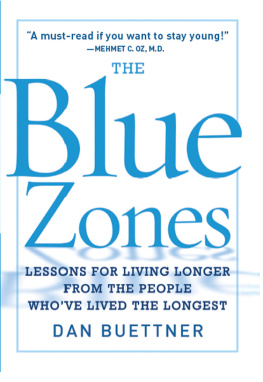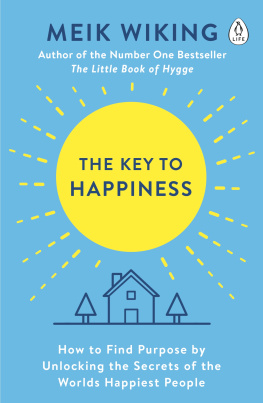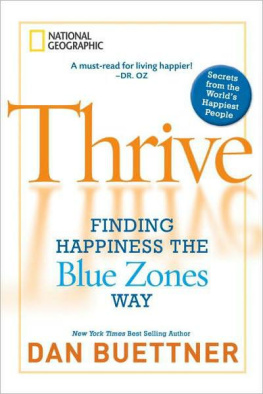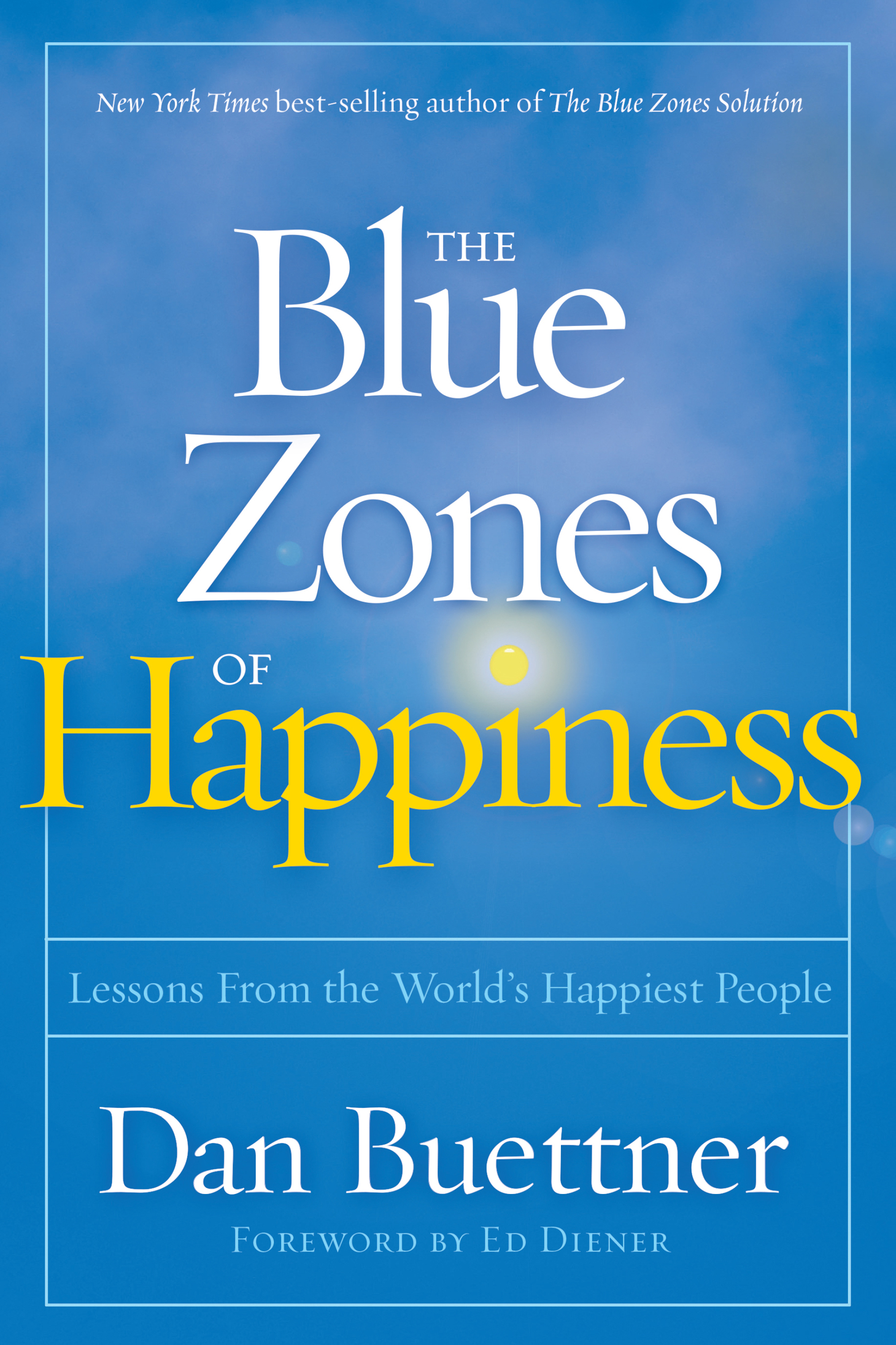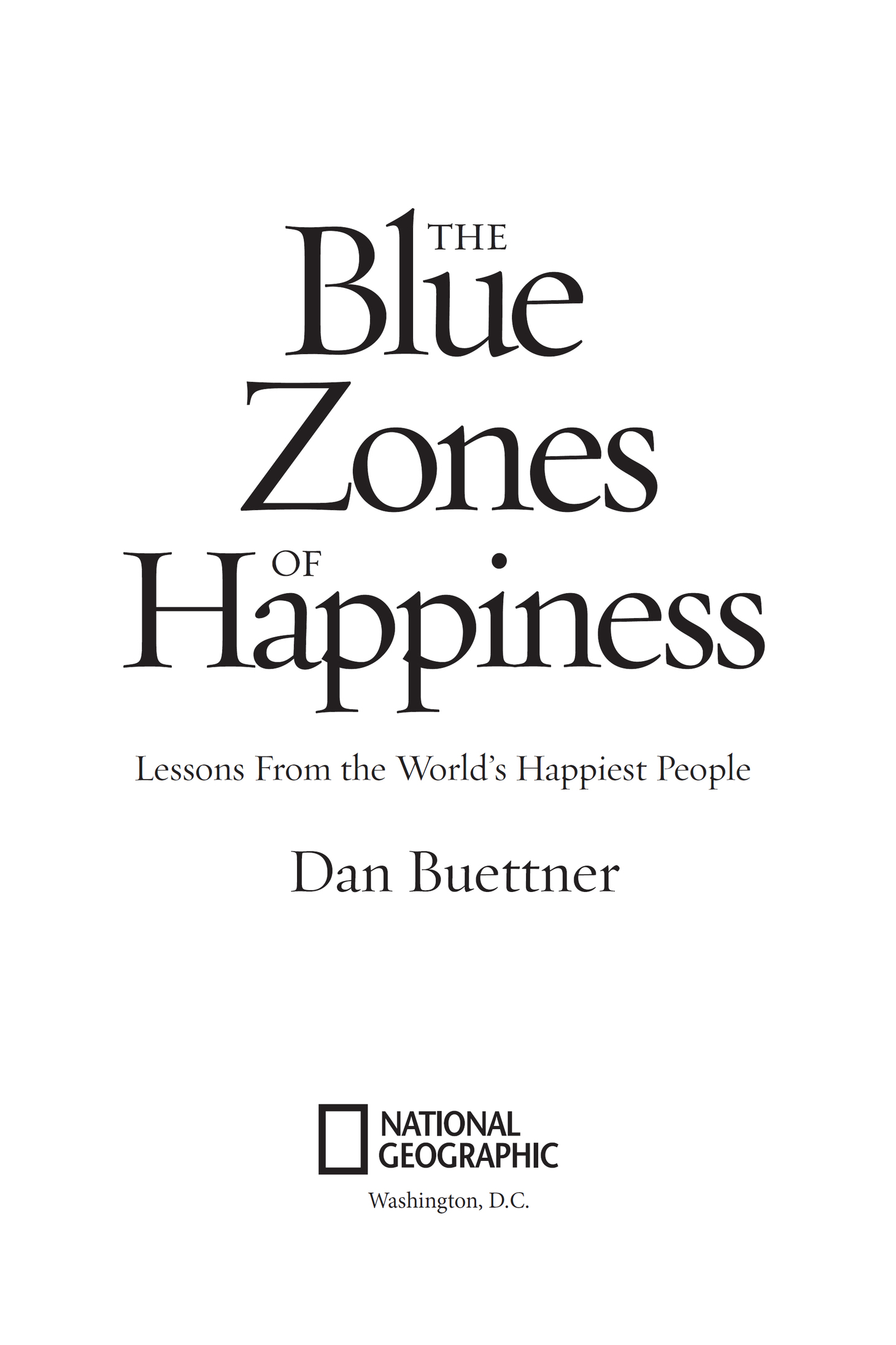Contents
Advance Praise for The Blue Zones of Happiness
Ive spent much of the past several years studying the science of well-being and what makes us thrive. In this well-researched book, Dan Buettner presents us with the latest innovative and story-driven science on how to shape our surroundings in ways that make us happier and more fulfilled. Blue Zones of Happiness is a compelling read and a useful guide for a better life.
A RIANNA H UFFINGTON ,
founder of The Huffington Post and Thrive Global
How do we build happy livesfor ourselves and for others? Happiness expert Dan Buettner draws on cutting-edge research, real-life examples, and lessons from across the globe to identify the strategies we can use to incorporate the crucial elements of happiness into our workplaces, homes, and communities. Comprehensive, thought-provoking, and compassionate, The Blue Zones of Happiness is a valuable blueprint for building better lives.
G RETCHEN R UBIN ,
New York Times best-selling author of The Four Tendencies and The Happiness Project
Its unusual to find a book on happiness thats both engaging and evidence based. Dan Buettner didnt just write that book; he made it useful, too. Drawing on his geographic talents, he shows that happiness isnt just about who you are but where and how you live. Place mattersand this book deserves a place on your shelf.
A DAM G RANT ,
New York Times best-selling author of Originals, Give and Take, and Option B (co-written with Sheryl Sandberg)
A LSO BY D AN B UETTNER:
The Blue Zones: Lessons for Living Longer
From the People Whove Lived the Longest
Thrive: Finding Happiness the Blue Zones Way
The Blue Zones Solution: Eating and Living
Like the Worlds Healthiest People
Published by National Geographic Partners, LLC
1145 17th Street NW, Washington, DC 20036
Copyright 2017 Dan Buettner. All rights reserved. Reproduction of the whole or any part of the contents without written permission from the publisher is prohibited.
NATIONAL GEOGRAPHIC and Yellow Border Design are trademarks of the National Geographic Society, used under license.
ISBN9781426218484
Ebook ISBN9781426218491
Since 1888, the National Geographic Society has funded more than 12,000 research, exploration, and preservation projects around the world. National Geographic Partners distributes a portion of the funds it receives from your purchase to National Geographic Society to support programs including the conservation of animals and their habitats.
National Geographic Partners
1145 17th Street NW
Washington, DC 20036-4688 USA
Become a member of National Geographic and activate your benefits today at natgeo.com/jointoday.
For rights or permissions inquiries, please contact National Geographic Books Subsidiary Rights:
Interior design: Katie Olsen
v4.1
a
For Kathy
This publication is based on research and contains the opinions and ideas of its author. It is intended to provide helpful and informative material on the subjects addressed in the publication. It is sold with the understanding that the author and publisher are not engaged in rendering medical, health, or other professional advice to the individual reader. The reader should not use the information contained in this book as a substitute for the advice of a licensed health care professional.
To the best of the authors knowledge, the information provided is accurate at the time of its publication.
The author and publisher disclaim any liability whatsoever with respect to any loss, injury, or damage arising directly or indirectly from the use of this book.
CONTENTS
CONCLUSION
The Power 9 of Happiness
Foreword
D AN B UETTNER BRINGS TOGETHER in this book a wonderful mix of inspiring stories and practical recommendations to help you understand happiness and how you might increase it in your own life and in those of people around you.
Unlike those found in many books on happiness, his recommendations are based not on hunches, opinions, or guesswork, but on scientific findings. I have been conducting scientific research on well-being for the past 35 yearson measuring it, determining what causes it, and learning what happens when people achieve it. It is exciting to see a world-class popular writer such as Dan use the findings from the research that I and others have been pursuing.
Some of these recommendations apply to pretty much everyone. Exercising and eating nutritiously are all-around good ideas, for example. Spending quality time with others is also essential for most of us to achieve happiness, no matter where you happen to live. (In a recent study, we found that every person in Costa Rica who was asked mentioned that their family was a source of happiness for them.) Sustainable happiness also requires pursuing our goals and values, developing supportive relationships with others, and engaging in other endeavors that matter.
At the same time, as Dan recognizes, when it comes to happiness, one size does not fit all. Each person must individualize his or her own happiness program. What works for Dan might not work for me. I work long hours and love it, and I have no need or desire to cut back, while Dan recommends that you find a job that allows you to work less than 40 hours a week in order to spend more time socializing. So you can pick and choose from Dans recommendations to see which ones might work best for you, and then focus on those. Make them a permanent part of your life.
Another valuable aspect of Dans book is that, besides offering personal suggestions for happier individuals, it also makes policy recommendations for happier communitiesagain, based on scientific findings. These include such ideas as providing more green space, more bike paths, and more opportunities for people to exercise in nature, as well as zoning that allows residents to shop and work closer to home, reducing the horrendous amount of commuting that many now must undertake. This book is chock-full of such ideas derived from research about things communities can do to make life more rewarding.
The fact is that those around us, including our leaders and our larger social spheres, have a lot to do with our feelings of well-being. Even in a nation such as the United States there are happy and unhappy places, and these have a lot to do with their circumstances and the policies that drive them. We might fool ourselves into thinking our happiness is entirely up to us, but in truth our friends, community, society, and even our nation can do a lot to help or hinder us. Societal and organizational policies complement and enhance peoples own activities in determining how happy they are.
It might surprise you to learn that I occasionally come across leaders both in business and government who object to such policies on principle, because they believe that happiness is something that people need to pursue on their own. They view it as a luxury, or a hobby, and say that things such as work, values, and the welfare of society must come first. Some even see happiness as a hedonistic endeavor, concerned with individual pleasure rather than the well-being of others.


